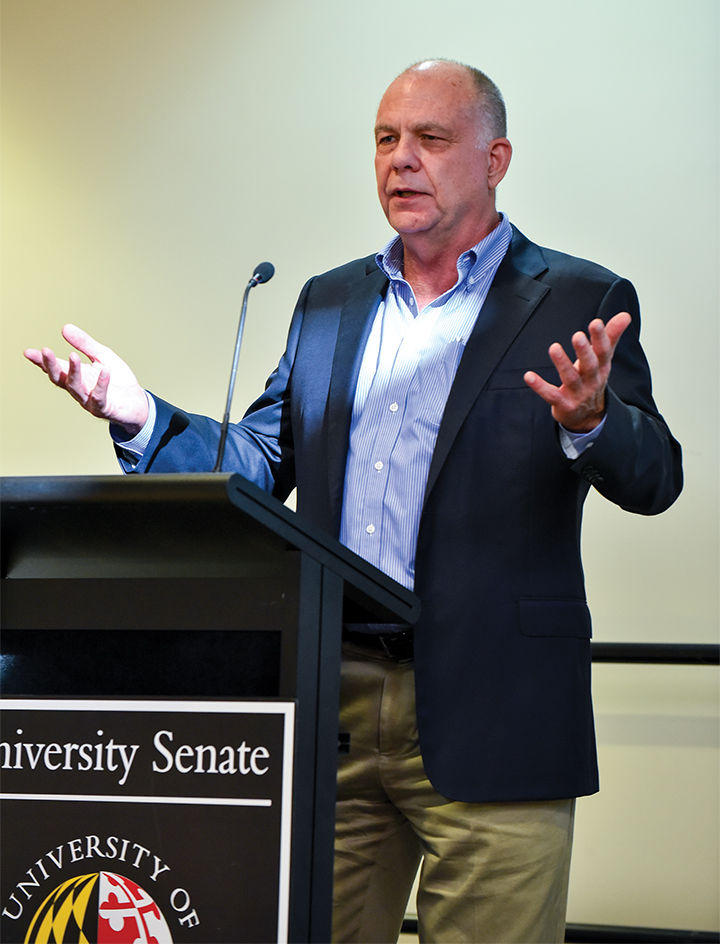
Bob Dooling, Chair of the IP Subcommittee of the Research Council, speaks at the University Senate meeting on October 7, 2015 in Stamp.
The University Senate unanimously decided Wednesday to return an update of the university’s intellectual property policy to committee after several members expressed dissatisfaction with specific parts of its rewrite.
The proposed update focused on simplifying the rules behind the ownership of faculty members’ published or invented work created while employed by this university. The update reworded the original 2003 intellectual property policy, which has not changed since its inception.
The proposed policy will go back to the Intellectual Property Committee, which will examine the complaints and suggestions made regarding the bill and work to bring the update to the senate floor again, said Reka Montfort, senate executive secretary and director. There is no deadline for its completion.
Now the subcommittee will focus on faculty and student feedback to help in “getting it right,” said Patrick O’Shea, vice president of research and member of the Intellectual Property Subcommittee.
“Our goal is to have our works get out to the public as easy as possible,” he said. “As I say, we want to be the lubricant, not the proxy in the gears of process.”
The new policy changes impact wording, vocabulary and readability to cut the policy to nine pages. To do this, it removes complex ideas and clarifies redundant language.
Under the proposed law, the university gains ownership of intellectual property if faculty use significant funds or resources, such as grants or university labs, in the creation of the work, O’Shea said. For example, the university can own “traditional scholarly works” such as books, syllabi, online courses, inventions software and research materials made while under the university’s employ. Under both policy versions, students almost always own all rights to their creations made for academic courses, unless they are employees.
Most of these guidelines also existed under the previous policy but faculty members are now aware since the bill is easier to understand, said Anne Bowden, associate general counsel.
“The old policy was 40 pages,” Bowden said. “People didn’t read it. So now they have a nine-page policy, two pages of definitions, and they can read it and read it in less than half an hour and it’s clear. … Whatever’s in this policy, chances are it’s in the current policy, but it’s different language and it’s more obvious.”
During the open forum, faculty from the computer science department and college of information studies said they had a problem that the policy approaches software like a copyright, giving ownership to the university. This is ineffective for these faculty members because they depend on software to be open-source to share with colleagues, researchers and students.
“Many of our faculty, both in the departments of engineering and computer science colleges, has not had a chance to look into these details,” said Jayanth Banavar, computer, mathematics and natural sciences college dean. “They are considered about many, many different things, and for such an important matter that actually affects their lives, it would be very nice to recommit, get feedback and move forward.”
During the forum, engineering professor Hubert Montas also urged the senate to recommit the policy, pointing out that under the original policy, creators receive 50 percent of the financial share, while they receive 25 percent of the share under the new policy.
But that wasn’t exactly true, Office of Technology Commercialization Executive Director Gayatri Varma said, and the complexity of the original policy is to blame. Revenue-sharing is much more complicated in the original version, as the money is divided among various parts of the university and colleges over time. On average, the inventor receives closer to 34 percent. Under the existing policy, more money is also given to the departments to encourage further research.



